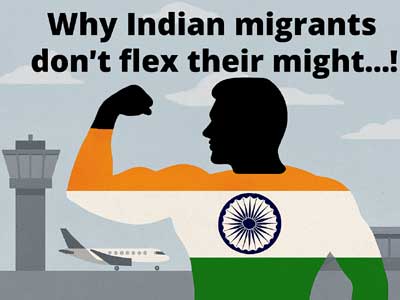Those who claim to run Silicon Valley, hold power in several countries, and save lives in American hospitals, why are they silent on the world's injustices? Why does the most successful community appear to be the most ineffective?
In 1972, when Ugandan dictator Idi Amin expelled 80,000 Indians, the world remained silent. In 2022, during the Russia-Ukraine war, India evacuated 22,000 students, but it was the same story once again: students or workers are expelled from somewhere or another, the most brilliant migrant community, yet victims of international circumstances, not their creators.
Today, over 32 million people of Indian origin spread across 150 countries worldwide are examples of success. In the US, their average annual income is $123,700, double the national average. Giants like Google's Sundar Pichai and Microsoft's Satya Nadella are changing the world's map. Rishi Sunak has served as Prime Minister of Britain. In Canada, 20 Members of Parliament have been of Indian origin.
However, when it comes to defending collective interests, this community appears to be beating a stick in water. Consider this comparison. The Jewish diaspora community in America spends $100 million annually through organisations like AIPAC to maintain its policy and security priorities. When 13 Democratic lawmakers opposed financial aid to Israel, six of them were defeated in elections. On the other hand, when former Canadian Prime Minister Trudeau accused India, there was no proper response, no protests, no pressure, from the 1.4 million Indian-Canadians. It's as if silence has become their destiny.
The roots of this ineffectiveness run deep. While the Jewish community remains united for Israel, the Indian diaspora is fragmented; they are Punjabi, Tamil, or Gujarati first, and then Indian. "Where there are thirty-seven fifty-two, the kitchen doesn't cook." This is the situation of Indian migrants—everyone plays their own tune.
The second major problem is a fear of confrontation. When Indian embassies in the US and UK were attacked, the migrant community's response was silence. People of Indian origin donate millions of dollars to institutions like Harvard, $75 million from just two donors, yet these same institutions hold anti-India programs and provide platforms for Khalistani ideologues. In contrast, Jewish donors withhold funds until anti-Semitic content is removed from campuses.
Most unfortunately, despite such economic prowess, these people have failed to build their diplomatic influence. India receives $125 billion in remittances every year, but this holds no political value. When Qatar imprisoned eight former Indian naval officers, India simply folded its hands. If it were China, it would have used diplomatic leverage to free its citizens.
The Indian government is not without fault either. Israel has 22 overseas branches that monitor diaspora affairs. India, on the other hand, closed its Ministry of Overseas Indian Affairs in 2021, in the name of budget cuts. "A cumin seed in a camel's mouth."
In the Gulf countries, eight million Indian migrants still work in near-slavery conditions, passports confiscated, no rights whatsoever. When Saudi Arabia executed 41 Indians last year in alleged 'drug cases,' India's response was a formal letter of protest.
Meanwhile, American universities earn $8 billion annually from Indian students and, at the same time, host conferences like ‘Uproot Hindutva’—which would have been shut down long ago if they were about Islam or Judaism.
The time has come, either organise or perish. The migrant community needs to establish an influential organisation like AIPAC. Giants like Sundar Pichai and Satya Nadella should use their corporate influence. And, the Indian government also needs to change its thinking; it must consider the diaspora not as a 'cash machine' but as a 'strategic partner.'


















Related Items
Indian scientists helped rewrite a 50-year-old biological rule
Indian roads have become a gateway to hell due to canine, simian nuisance
Redefining Indian Highways; Driving innovation, Delivering connectivity…